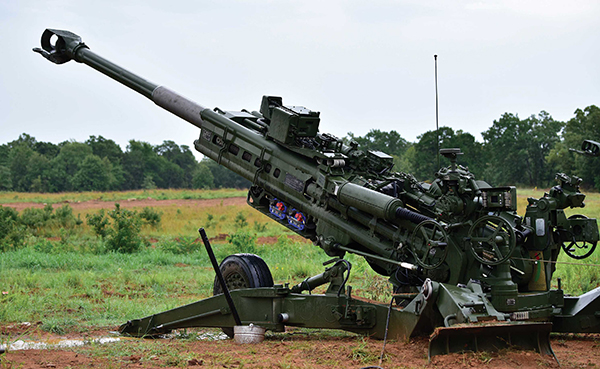India and the US are exploring the possibility of jointly developing and manufacturing a variant of the M777 ultra lightweight howitzer with an extended range. The Army had bought the original gun for deployment against China along the tense Line of Actual Control (LAC).
Sources in the defence and security establishment said National Security Advisor (NSA) Ajit Doval and his American counterpart Jake Sullivan discussed the issue in Washington earlier this month.
The two sides are in talks to develop a new version of the artillery gun called the M777 ER (Extended Range), said sources. It is learnt that the 145 howitzers currently in use by the Army could also be converted into extended range.
Sources also said that even the US military does not have the proposed version of the M777 and that its development would entail the production of a specialised kit, besides a new barrel.
There is scope for India to produce the guns indigenously, export them and become part of the global supply chain for the American artillery system manufactured by BAE Systems.
The maximum firing range of the M777 howitzer is 24.7 km with unassisted rounds and 30 km with rocket-assisted rounds. It can also fire specialised ammunition that can extend its range to about 40 km.
Sources said the idea is to extend the actual range of the gun as a standalone entity, while also developing longer-range munitions.
The Indian side has been very clear that there is a need to convert intentions and ideas into actions and specific deliverables through focussed steps in a time-bound manner.
India had specifically gone in for procurement of the 155mm/39 calibre M777 howitzer, which is meant for use on mountainous terrain.
All M777 howitzers currently in use by the Army have been deployed along the LAC with a heavy concentration in the northeast, which is flush with mountainous terrain and multiple passes that make normal transportation of artillery systems a challenging and arduous task.
While 25 howitzers were delivered off the shelf, the rest were assembled in India by Mahindra Defence, which has a tie-up with BAE Systems.
In 2018, India purchased 15 Chinook heavy-lift choppers that can carry the M777s as an underslung load. The choppers were delivered by Boeing in 2020.
What is M777 howitzer
Developed for the US Marine Corps and the US Army to replace M198 towed 155mm howitzers in 1997, the gun — unlike traditional artillery systems — is ideal for quick transport owing to its weight.
It is largely made up of titanium and titanium castings and each unit weighs less than 4,000 kg.
The M777 is capable of firing four rounds per minute of intense firing and two rounds per minute of sustained firing.
Incidentally, while the M777 has seen action in Afghanistan, the ongoing Russia-Ukraine war has thrown up some key issues with the artillery gun.
The US had sent over at least 142 M777s to Ukraine, and the Ukrainian troops have been using them extensively to target Russian positions.
According to one report by The New York Times, Ukrainian forces are firing 2,000 to 4,000 artillery shells a day. Over time, that pace has caused problems for Ukrainian soldiers using the M777, such as shells not travelling as far or as accurately, the report said. Some of the issues can be traced, in part, to the howitzer’s design, it added.
“Built largely with titanium, which is lighter than steel but just as strong, the weapon is easier to move on the battlefield and quicker to set up than earlier guns — a clear advantage for the United States when it began using the M777 in Iraq and Afghanistan in the early 2000s. In those wars, unlike in Ukraine, the M777 was generally used to fire small numbers of shells in support of troops,” said the report.
Moreover, the M777 howitzers have to undergo frequent repairs, and a change of barrel becomes a necessity in many cases because of their extensive firepower.


















